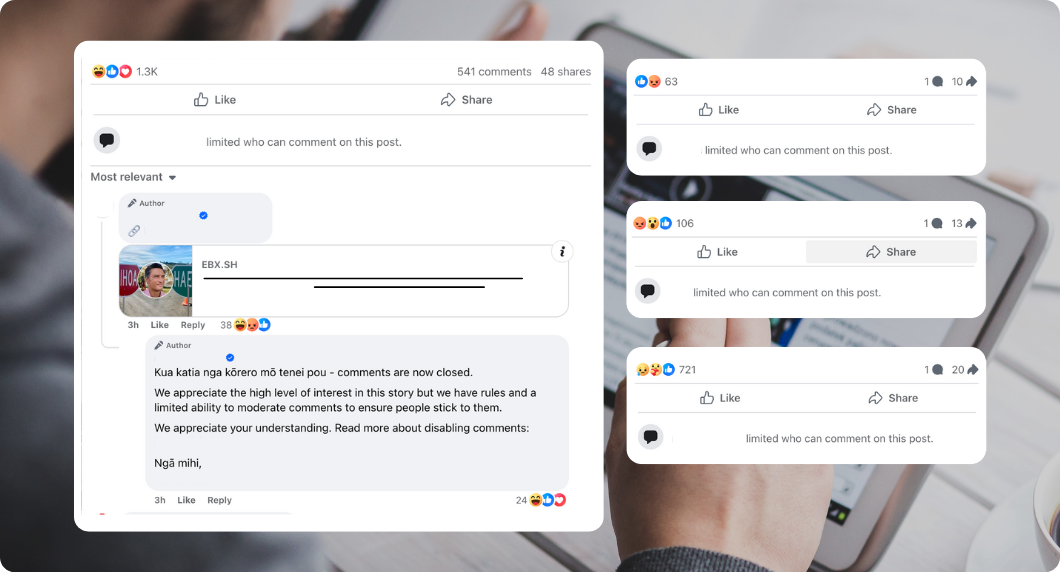
Introduction
In digital content ecosystems, comments really matter. Research shows that:
- Research shows that 77.9% read comments
- Consumers respond more negatively to posts with disabled comments than to those with negative comments.
Social media comments draw the attention of approximately 78% of social media users, making the comment sections one of the most influential yet overlooked spaces for public perception. However, because people expect to read comments at the same time as viewing the actual post, when the comments sections are disabled, people react negatively.
However, the solution isn’t as simple as leaving the comments enabled for all posts, all the time. Some organizations have to navigate resource constraints, backlash and legal risks when the comments are kept on. This creates a challenging dilemma for brands: should they disable comments or invest in the resources to manage them effectively?
In this article, we explore the impact of disabling comments across four key sectors:
- B2C brands
- Entertainment media
- News media
- Sports teams + organizations
Disabling comments: B2C brand
It comes down to trust and engagement. Nearly half (48%) of consumers strongly agree that they read social media comments to understand what others are saying about brands. For well-known brands, transparency is not just expected. It’s a core part of building trust. Disabling comments can create a perception of evasiveness or a lack of accountability, and has the potential to undermine earned trust.
While it’s not easy to see the direct line to financial outcomes, research suggests that turning off comments can have a direct impact on the sales funnel. A study on influencer endorsement marketing found that when comments were disabled, there was an 11% drop in the number of people interested in learning more about the product. Ultimately, brands that prioritise transparency and engagement build trust among their community, which is essential for long-term brand building and commercial success.
What should B2C brands do?
To maintain trust and engagement among their online audiences, B2C brands should always enable comments and implement a proactive engagement strategy. Brands should:
- Respond to negative comments (approximately 20%)
Engaging with negative comments taps into an element of surprise (“I never thought they would actually reply”). It also signals to the wider community that the brand cares about their customers and makes an effort to listen to their issues. - Avoid comment lockdowns
Disabling comment sections can create a perception of distrust or a lack of accountability. It also reduces engagement with the post, limiting the conversion of the sales funnel on activation posts. - Create a strategy for engaging with comments
A well-defined strategy for replying to comments ensures that responses are timely, relevant, and authentic. It should outline which types of comments and topics warrant a reply, as well as the appropriate frequency, allowing you to focus your efforts where they matter most.

Disabling comments: Entertainment media
Turning off comments can be especially harmful in the entertainment industry, where conversations around new movie releases, fresh series drops, or live sports events are a core part of the experience. Fans don’t just watch–they engage, debate, and share opinions in real time.
Disabling comments cuts off vital interaction, leaving audiences frustrated and disconnected from the content. What’s more, audiences won’t stay silent – they’ll take their conversations elsewhere, moving to other platforms or private channels where brands have little oversight and ability to intervene.
Studios and streaming platforms often disable comments during PR crises. But doing so can backfire, making recovery even tougher. Blocking discussion around new releases or promotional content not only stifles engagement but also restricts the reach and impact of marketing campaigns.
What should entertainment media do?
Instead of risking the fallout from disabling comments, entertainment companies should focus on managing them effectively. Consider Disney’s approach to the teaser trailer launch of ‘Mufasa: The Lion King’ in 2024. The initial trailer received significant backlash, with top comments including:
- “Without a drop of nobility” so this movie literally retcons Mufasa’s whole conversation with Simba, making him the first king of the Pride Lands – 6.6k likes
- It’s funny how Lin Manuel Miranda agreed to write original songs for this movie instead of Moana 2 – 5.9k likes
Disney chose to turn comments off for this trailer, which only pushed the conversation elsewhere – sparking thousands of discussions on Reddit and an article from Imdb. This backlash ultimately worked against Disney, frustrating their loyal community and overshadowing the trailer’s intended impact.
For subsequent trailers, Disney left the comments on. This allowed them to keep communication channels open and encourage conversation among Lion King fans. Sense’s analysis of the final trailer showed a more balanced sentiment. By keeping conversations open, Disney encouraged more discussions to take place on their own channel, giving them valuable insight into audience reactions rather than letting rumours spread unchecked on other platforms.

Disabling comments: News media
News outlets face a credibility paradox when disabling comments. While turning off comments can reduce misinformation and stop harmful or off-topic discussions, it can also make audiences distrustful, as it may seem like the outlet is silencing audience discourse or censoring viewpoints.
In sensitive cases, restricting comments can protect privacy and lower legal risks, however, there are more effective ways to safeguard those involved. Automated moderation ensures harmful comments are minimised, without the need to disable discussions entirely.
What should news media organizations do?
- Implement clear moderation policies
Instead of disabling comments, establish clear and transparent moderation policies that define acceptable behaviour and how harmful content will be handled. This helps news media brands maintain positive engagement, while protecting the integrity of their platform. - Invest in a comment moderation solution
Allocating resources to comment moderation is key to enforcing a moderation policy. Tools like Sense's Community Builder offer automated solutions to efficiently manage comments and prevent harmful content

Disabling comments: Sports teams + organizations
Sports teams and organisations face a delicate balance: protecting athletes from online abuse while maintaining fan engagement. A single poor performance or controversial decision can spark a wave of negative comments, which can harm players' mental health and impact the club's reputation. Athletes are particularly vulnerable to cyberbullying, affecting both their careers and personal well-being.
However, sports fans are the backbone of any club. They drive revenue through tickets, merchandise, and sponsorships, making their engagement crucial. Shutting them out by disabling comments can damage long-term relationships and limit positive interactions. The solution lies in moderating the conversation, ensuring toxic behaviour is addressed while maintaining a space for constructive fan engagement.
What should sports teams + organizations do?
Invest in Advanced Moderation Technologies:
- Utilise advanced community moderation
Deploy AI-powered moderation that filters out abuse while preserving the space for passionate discussions - Support athletes
Enable athletes to focus on their performance by providing social media management support to prevent online harm - Communicate with fans
Be transparent about moderation policies, ensuring fans understand that protective measures are in place to safeguard both players and the community, rather than being seen as restrictive

How Sence enables brands to keep comments safe and open
At Sence, we believe organic conversation is the foundation of strong communities. That’s why we’ve developed an AI-powered comment moderation software, so brands don’t have to rely on disabling comments as their community management strategy.
Our Community Builder solution empowers brands to safely manage engagement on their platforms through features like:
- Context-aware comment moderation
- API integrations to manage social media channels through a centralised platform
- Custom filters to monitor and track key words
- Suggested comment replies aligned to your brand tone of voice


.png)
.png)